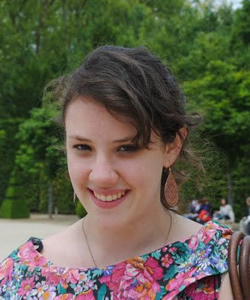I sit in a living room, lined with traditional Moroccan couches, around a table of four generations of Moroccan women. We are piled with blankets—we don’t have indoor heating and it can drop to 40 degrees at night—cupping bowls of red harira and mint tea. We just sit. We listen to the sounds of the call to prayer, silently reflecting. I am prodded by a woman I have never met to eat more; it is a sign of hospitality and love. She piles my plate high with milwee, similar to pancakes, and drenches them in honey. I am not hungry, but I eat. My host family and I come here about four times a week, to the Big House.
The Big House is the family headquarters. There are eighteen people and two American students permanently living in it. Every day relatives bustle in and out, picking up children, throwing them in the air as they laugh hysterically on the way down. There are two kitchens and always food to be found. When I enter, I kiss everyone I can find, poking my head into the winding rooms of the house—I still have not seen them all.
While I am there, I am not observing, I am participating in the family experience. As soon as I set foot in the kitchen, there is a piece of bread in one hand and a cup of tea in the other as I am ushered to the table. My host mother stops by to say “Koulee, koulee!” (eat, eat), as if I would ever go hungry. There is family everywhere, smiling at me and exchanging all the words I can muster in Darija to describe my current state. The family bonds are almost palpable as great-grandparents hold children and cousins play soccer in the yard. The house feels alive and warm.
I have learned to just sit. I don’t check my phone; I don’t make lists of all the things I need to do as I used to do at school; I don’t feel guilty for perceived unproductivity; I just sit. I try to remember the last time my entire family just sat in one house, if ever. I see my cousins maybe once every few years since I started college, and my grandparents and aunts and uncles maybe twice a year if I’m lucky. I cannot speak for all Moroccan families, but mine is more tightly knit than anything I have ever experienced before.
Two weeks ago, there was a family tragedy: one of the older men of the family passed away. My host parents, sister, and brother all slept at the house for three nights. The funeral began at the Big House on Friday and continued until Sunday. In that time I visited the house each day. Six American students are staying with members of the extended family, and like our Moroccan relatives we too reunited each day. We tread softly and cautiously, concerned about being respectful, unsure of the expectations of us. At a time when I could have easily felt like a burden on a family in mourning, I continued to feel welcome.
During those three days, more than one hundred people moved through the house. Tents were set up in the yard to accommodate the newcomers. For the final dinner on Sunday night, the family cooked 128 chickens. A funeral is a family event. I sat at a table with the other Americans and our host siblings. We picked at the chicken with our hands from a shared plate in the middle of the table. Everything is communal. There were four water glasses for ten people. We struggled not to laugh and crack jokes the way we normally do, attempting to be respectful, although we had little idea what was going on.
There were almost two separate moods at the house that weekend. At times it was solemn and reflective, at others it felt like a family reunion. We played the largest games of UNO I’ve ever participated in, with twelve or fifteen children, little ones sitting in laps as we teamed up to help them learn the rules. I was dragged onto the trampoline by a 4 year old and played a rousing game of monkey in the middle. Everyone calls me Dounia, which means the world, or source of life. The name is a tall order, but with a family that never ceases to give, I am trying my hardest to live up to it.

